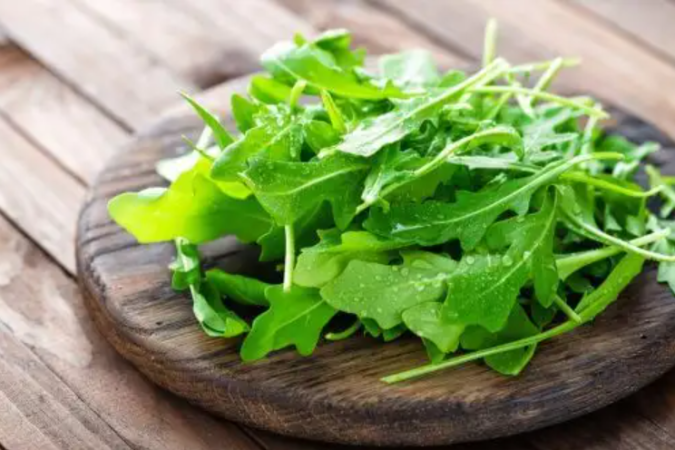 Although it is not usually considered a healthy diet component, several Arugula properties can be named that make it a very outstanding food.
Although it is not usually considered a healthy diet component, several Arugula properties can be named that make it a very outstanding food.
With a characteristic flavor and a beautiful presence, it is used to decorate many dishes and as the main ingredient.
If you want to know all its strengths and discover a simple and delicious recipe, we encourage you to continue reading the following article.
Contents
Arugula, the ideal Mediterranean plant for salads
Arugula ( Eruca vesicaria ) is a vegetable from the Brassicaceae or cruciferous family, like kale, Brussels sprouts, or broccoli.
Its origin originated in Italy, which was already cultivated in Roman times. Traditionally, wild plants were collected. It has not been until the last decades that cultivation has begun on a larger scale.
It is highly appreciated in some countries and adds a spicy touch to many dishes, especially salads. In addition, it also stands out for its nutritional contribution, the leading cause of the properties of Arugula for health.
Seven Properties of Arugula
As the popularity of this plant in the kitchen has grown, so has the interest of specialists and researchers to highlight its benefits and possible benefits. Below we list the most prominent.
1. Provides nutrients
One of the first properties of Arugula that should be mentioned is its quality as a food. As indicated by the United States Department of Agriculture (USDA), in 100 grams of raw leaves, the following nutrients stand out:
- Energy: 25 Calories.
- Carbohydrates: 3.65 grams.
- Fats: 0.66 grams.
- Protein: 2.58 grams.
- Fiber: 1.6 grams.
In addition, as with most vegetables, it has an interesting contribution of vitamins (A, C, K, and folates) and minerals (potassium, calcium, and magnesium). It also contains other non-nutritive compounds but with activity in the body.
Despite its nutritional value, a full cup of Arugula leaves only weighs 10 grams. Therefore, the total amount of each vitamin or mineral is not very abundant.
So it is better to consider it as a food that completes the contribution of these nutrients and not as a great supplier.
2. It is a source of fiber
As specialists from the Harvard School of Health indicate, 25 to 35 grams of fiber are needed daily to maintain good health.
It is a component present in some foods that the body cannot digest. In this way, it passes intact through the digestive tract and exerts some positive actions:
- Regulates the increase in blood glucose.
- It improves intestinal transit and protects against intestinal diseases ( such as diverticula ).
- It is food for the intestinal microbiota.
- It slows down gastric emptying and promotes the feeling of satiety.
 As the authors of this recent study indicate, there is strong evidence to suggest that fiber can improve health. It has been observed that people with a higher intake (in the form of vegetables, fruits, or whole grains) have more excellent protection against chronic diseases.
As the authors of this recent study indicate, there is strong evidence to suggest that fiber can improve health. It has been observed that people with a higher intake (in the form of vegetables, fruits, or whole grains) have more excellent protection against chronic diseases.
3. Promotes better cardiovascular health
Pathologies related to the cardiovascular system have a high incidence worldwide. Faced with its many conditioning factors, diet can be modified and have a positive impact.
In this sense, and according to data published in the journal Nutrients, a Mediterranean-style diet or a quality eating pattern is the most effective.
Whatever the chosen way of eating, vegetables, especially green leafy vegetables, play a crucial role.
As the authors of this study published in the Cardiovascular Journal of Africa indicate, higher consumption of these is related to a lower risk of stroke, heart disease, and stroke. However, the authors point out the need for further research.
4. It can reduce the risk of cancer
Some of the main compounds and vitamins in Arugula give it antioxidant capacity. Thanks to this type of molecule, the body can deal with the damage caused by excess free radicals.
As read on the National Cancer Institute page, the latter is responsible for damaging cell membranes and DNA, which, in turn, can be identified as a possible cause of some types of cancer.
In addition, another of the properties of Arugula in this sense is the presence of glucosinolates. These organic substances are also found in other green leafy vegetables.
Scientific evidence indicates that higher consumption of cruciferous vegetables is associated with lower lung and colorectal cancer incidence.
However, since many other possible triggers exist, it is preferable to be cautious before classifying food as an anti-cancer.
5. It is positive in pregnancy
Folate is a B-group vitamin found in some vegetables. Its presence in the body is necessary to help form DNA and other genetic material.
It becomes an essential nutrient during pregnancy and in the months following it. Apart from folic acid supplements, it is necessary to provide folates in the diet to help prevent neural tube malformations in the baby. Specialists from the National Institute of Health of the United States indicate this.
6. Helps in weight loss
Like all vegetables, Arugula is light and weighs little, but it adds volume to dishes. For this reason, it can be an ally when diets with a slight calorie restriction are followed, as it helps to satisfy the appetite without much energy intake.
7. Promotes good bone health
Vitamin K is necessary to keep bones in good condition as it promotes the integration of calcium and collagen synthesis. This can be read in an analysis published in the Journal of Osteoporosis and Mineral Metabolism.
In addition, it can also suppress bone resorption, a process by which the bones lose part of the minerals which pass into the blood.
The same authors point out that a deficiency of this can have detrimental effects on the state of the bones. Specifically, it has been associated with an increase in the number of hip fractures.
How to introduce Arugula into the diet
The most common way to consume this vegetable is raw. You have to wash it; it is ready to eat or used to prepare different dishes.
The most recurring thing is to serve it alone or accompanied by other ingredients and seasoned with oil and salt. However, there are more possibilities to innovate and enjoy its benefits. So you can add in:
- Salads of all kinds, as it combines well with many foods: tofu, chicken, chickpeas, tomatoes, burrata, nuts, etc.
- Sandwiches and toast with tomato, fresh cheese, or avocado.
- Pizza. Once out of the oven, they give a lovely visual touch and a delicious contrast.
- Some sauces, for example, pesto (replacing basil).
- In soups, stir-fries, or with a pasta dish. It can be integrated into this recipe, and try the cooked Arugula. These are good options for people who find their taste a bit strong.

It must be borne in mind that Arugula lasts very little time fresh. Therefore, it is recommended not to store it for more than one or two days before consuming it to enjoy it in good condition.